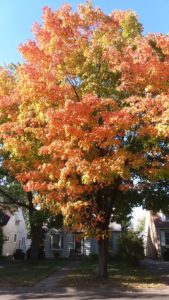
I’m writing this on the back porch of our home in St. Louis Park, Minnesota, a near suburb of Minneapolis. My laptop is on a little table in front of a window, so I have a full view of our backyard and of our neighbors’ behind us. Especially this time of year, I look forward to coming out here and working. The trees I can see from my porch have begun to change color, and each day there’s a little more yellow, orange, and deep red in the leaves than there was the day before. I enjoy watching autumn unfold.
Having something to look forward to, something as simple as leaves changing color, may not be on the top of the list about how to cope with stress or enhance recovery from mental illness. But day to day, as I sustain my recovery, I see how important it is for me to get out of bed with something, however small, to look forward to. Ever since I was a little boy, I’ve been a baseball fan, so checking out the sports section and the box scores is something I’m eager to do first thing in the morning. The first cup of coffee is also a morning treat and breakfast certainly can be, depending a lot on who, my wife or I, is the designated breakfast maker for that morning. So it is throughout the day, there’s this and that I’m looking forward to.
I invite you to think about what in your life is like these things are for me. I suspect that for many of us the church year gives us things to look forward to. Most of our churches have just had some form of Rally Sunday, whether in person, electronically, or a hybrid of the two. I always enjoy this Sunday, seeing the church school kids again after the summer, feeling the energy as we begin a new program year. COVID has changed lots of things, but Rally Sunday is still fun.
Before long we will be getting into stewardship, and plans will be underway for some kind of stewardship celebration Sunday. When I was serving churches and symptomatic with depression, it was also a time of great anxiety and catastrophizing. These days in retirement, though I certainly want the church we belong to do well, it also feels a little like checking a box score. Did we win? Maybe it will go into extra innings. Did a relief giver step up?
And then, before you know it, we’re into Advent where each Sunday offers something special to look forward to. Our church honors the custom of the Advent wreath with one more candle being lit each Sunday as we move toward Christmas. Like the leaves changing in autumn, it’s something to look forward to every year. And of course, come Christmas Eve, we get to see people at church who haven’t shown up for a long time. So it goes through the church year, one thing to look forward to after another.
I’m involved here in the Twin Cities with Vail Place, a clubhouse for people living with mental illness. Starting soon after the pandemic, I’ve been making fifteen or so outreach calls to members each week, checking in, asking if they’re OK, making sure that they are staying connected with our clubhouse community. Almost always during these calls, I ask the person I’ve called what they’re looking forward to. If the question draws a blank, we try to come up with something, often it’s an event on the clubhouse calendar that sounds good to them. Besides the human contact, and sometimes I’m the only person they talk with during the day, finding something to look forward to is the most useful thing about the call.
I want to celebrate the things – autumn leaves, first cups of coffee, a child waving her hand at children’s time, friendly phone calls– that help us maintain our sense of mental well-being in this challenging time of pandemic, political turmoil, and economic uncertainty. It’s easy to take things we look forward to for granted, but it’s good to remember them, cultivate them, and thank God for them. So often it’s things like the autumn colors that get us through a challenging time.

Bob Griggs
Ordained in 1973, Bob Griggs has served UCC churches in Massachusetts, New Hampshire, and Minnesota. He is an Advisory Council member at Vail Place, a club house for people living with mental illness. He is also the author of A Pelican of the Wilderness: Depression, Psalms, Ministry, and Movies and Recovering from Depression: Forty-Nine Helps.